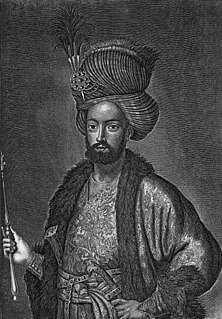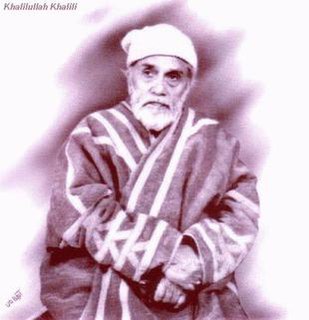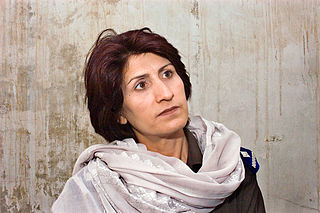This article is missing information about Early life, Career, Personal life, Achievements and honours.(October 2021) |
Shah Mahmood Safi was the Governor of Laghman in Laghman Province located in eastern Afghanistan. [1]
This article is missing information about Early life, Career, Personal life, Achievements and honours.(October 2021) |
Shah Mahmood Safi was the Governor of Laghman in Laghman Province located in eastern Afghanistan. [1]

Laghman is one of the 34 provinces of Afghanistan, located in the eastern part of the country. It has a population of about 502,148, which is multi-ethnic and mostly a rural society. The city of Mihtarlam serves as the capital of the province. In some historical texts the name is written as "Lamghan" or as "Lamghanat".

Sultan Husayn was the Safavid Shah of Iran (Persia) from 1694 until he was overthrown in 1722 by rebellious marauder Mahmud Hotaki, an Afghan of Pashtun ethnic background from the Hotak dynasty. His reign saw the downfall of the Safavid dynasty, which had ruled Persia since the beginning of the 16th century.

Khalilullah Khalili was Afghanistan's foremost 20th century poet as well as a noted historian, university professor, diplomat and royal confidant. He was the last of the great classical Persian poets and among the first to introduce modern Persian poetry and Nimai style to Afghanistan. He had also expertise in Khorasani style and was a follower of Farrukhi Sistani. Almost alone among Afghanistan's poets, he enjoyed a following in Iran where his selected poems have been published. His works have been praised by renowned Iranian literary figures and intellectuals. Many see him as the greatest contemporary poet of the Persian language in Afghanistan. He is also known for his major work "Hero of Khorasan", a controversial biography of Habībullāh Kalakānī, Emir of Afghanistan in 1929.
Fazlullah Mujadedi also known as Abdul Hameed Mujadedi or Abdul Hameed Fazlullah Mujadedi was an ethnic Arab politician in Afghanistan, previously serving as Governor of Logar, Laghman and Takhar provinces. He was one of the prominent commanders of Jamiat-e Islami during the 1980s Soviet–Afghan War. He was amongst the earliest generation of anti-Soviet fighters from Kabul University, which included Amin Wardak, Zabihullah of Marmul in Balkh and Ahmad Shah Massoud.
Alishing District is a district in Afghanistan, located 21 km from Mihtarlam, the provincial centre of Laghman Province. It has borders with Kabul and Kapisa provinces to the West, Dawlat Shah District to the North, Alingar District to the East and Mihtarlam District to the South. The population is 79,257 (2019) - 65% of them Pashai, 20% Pashtun and 15% Tajik. The district center is the village of Alishing (Alishang), located on 34.7044°N 70.1539°E at 862 m altitude. There are 12 zones, each with around 12 to 14 villages located in the valleys and mountains. The Alishing river crosses the district and is the main source of irrigation.
Dawlat Shah District is located approximately 74 km from Mehterlam, the provincial centre of Laghman Province in Afghanistan. It is a mountainous district and borders Nuristan Province to the North and North-East, Alingar District to the East, Alishing District to the South and Kapisa and Parwan provinces to the West. The population is 36,950 (2019) - 50% Tajik, 40% Pashai and 10% Pashtun. It has 60 villages. The district center is the village of Dawlat Shah, located on 34.9528°N 70.07°E at 1583 m altitude in the Hindukush mountains in the valley of the Alishing river. On 20 May 2021 it was captured by Taliban.

Nijrāb District,, also called Nijrāw, is situated in the central part of Kapisa Province, Afghanistan. It is located in a valley about 120 km northeast of Kabul. It borders Mahmud Raqi and Koh Band districts to the west, Parwan Province to the north, Laghman Province and Alasay District to the east and Tagab District to the south. The district center is Nijrab, located in the southern part of the district. The population of Nijrab District is 99,600 (2006), making it the most populous district of Kapisa.

Mohammad Gulab Mangal is an Afghan politician. Since October 2016, he has been serving as the senior adviser minister of borders and tribal affairs for the president of the Islamic Republic of Afghanistan. He is also actively involved in the tribal conflict resolutions. On 23 October 2016, he was appointed as the senior adviser for the minister of borders, tribal affairs, and provincial governor of Nangarhar province until he resigned in April 2018. From 22 April 2015 to 23 October 2016, based on the presidential decree, he was appointed as the acting minister of Ministry of Borders and Tribal Affairs. In 2002, he was elected as the Representative of Paktia Province for Emergency Loya Jirga. From 2002 to 2004, he was the Head of Constitution office for the south east region(Paktia, Paktika, Khost and Ghazni provinces and also Head of Constitution Loya Jirga election office for the South East Region. From 2004 to 2006, he served as Governor of Paktika province. From 2006 to 2008, he served as the Governor of Laghman province. From March 2008 to September 2012, he served as provincial governor of Helmand province.

Malalai Kakar was the most high-profile policewoman in the Islamic Republic of Afghanistan (2001–2021) during its existence.
Sāfī is a major branch of the greater Ghurghakhti Pashtun tribe. The Safi tribe comprises a majority in the Pech Valley of Kunar and are present in significant numbers in Parwan Province, Kapisa Province, Kabul Province, Laghman Province, Nuristan Province and the whole of Kunar Province. A reasonable majority also resides in different urban and rural areas of Khyber Pakhtunkhwa, particularly Peshawar, Charsadda, Mardan, Nowshehra, Swabi. A large number also settled in Rawalpindi, Tarnol, Karachi, Lahore, Multan. They are also present in large number in Mohmand, Bajaur Agency, Federally Administered Tribal Areas and in Zhob District, Balochistan,
Pakistan.

Kohi SafiDistrict is now one major historical district located in South-eastern Parwan province, Kohi Safi district is one of the most single districts where almost all of the region is populated by Safi tribe. Although in 1930s Kohi Safi was said to be one of the 2nd most populous district of Parwan after Charakar, but during 1930s-1940s the region was depopulated due to Governments pressure to evacuation of area due to Saf's War on the King. Majority of its population were displaced or escaped further in the north away from borders of capital Kabul, few escaped to west in modern Herat and many into it India. The root of the conflict seems to be started due to King Amanuallah Khan's proposal of modernization, Safi and with few other Afghan tribes armed against the ruling family of Durrani. Although some annalists assume the other factor behind the conflict and rise of Safi was mainly due to Safi's not being of ruling Durrani tribe, but rather Shinwari. Although Majority of Shinwari's enjoyed presence of Durrani and many were often involved into Government compare to those of Ghilzai, however Safis are always known to have history of conflict with many ruling governments and empires.
Gul Pacha Ulfat was born in 1909 in Qarghayi District of Laghman Province, Afghanistan. Ulfat was a prominent poet and author of the Pashto language.

Lutfullah Mashal is a politician in Afghanistan who last served as spokesman for the National Directorate of Security (NDS). Prior to that he was Governor of Laghman province. He is also a writer and a poet.
General Mohammed Asif Safi was an Army General in the Afghan National Army during King Zahir Shah's rule in Afghanistan, and later during the 1970s era of President Mohammed Daoud Khan.
Ghulam Hassan Safi (1902–1984) was a prominent Afghan politician and diplomat. He was one of the founding members of Afghan political movement Weesh Zalmyan. Other founding members of the movement were Qazi Bahram, Abdul Hadi Tokhay, Mohammad Rasul Pashtun, Fayz Mohammad Angar, Gul Pacha Ulfat, Qiamuddin Khadem, Ghulam Mohayuddin Zurmulwal, Abdur Raof Benawa, Nur Mohammad Taraki, and others.
Al Hajj Shah Mahmood Popal is a citizen of Afghanistan who was a candidate in Afghanistan's 2009 Presidential elections. Popal is a politician and a former commander during the Soviet occupation of Afghanistan.
Hanifa Safi was the regional head of the Women's Affairs Ministry for Laghman Province, Afghanistan, since 2008. She worked on cases concerning violence against women, supporting the women to overcome the violence. On July 13, Hanifa Safi was killed by a bomb attached to her car, also wounding her husband and her daughter, while driving through Laghman's capital Mehtar Lam. Mehtar Lam lies roughly 150 km north-east of Kabul. The assassination was widely condemned including by the United Nations. In 2006, in a similar case, the regional head for Women's Affairs in Kandahar Province was gunned down by the Taliban.
Surat Castle, or Surat Fort, is a 16th-century structure in the city of Surat. The Ahmedabad king Sultan Mahmood-III (1538-1554) ordered its construction to defend the city from the frequent attacks that had devastated it. He entrusted the work to Safi Agha, a Turkish soldier who had been ennobled with the title of Khudawand Khan.

General Mohammad Yasin Zia, is an Afghan military officer and politician. He is a former Chief of General Staff, former Deputy Defense Minister, and former governor of Takhar Province, Afghanistan. Zia has also served as head of Afghanistan's counter terrorism unit (2011) and as the deputy director of the National Directorate of Security (2011–2015).
The October 2020 Afghanistan attacks were multiple attacks launched by insurgents including the Taliban and Islamic State of Iraq and the Levant – Khorasan Province in October 2020. The attacks left at least 243 people dead and another 339 were injured. 10 perpetrators were also killed in these attacks.
Officials have been working in tandem with religious elders from all the districts who have promised to fight the drugs menace. Laghman governor Shah Mahmood Safi said clerics have been mobilised to convince farmers to destroy the poppy crops at mosque sermons.